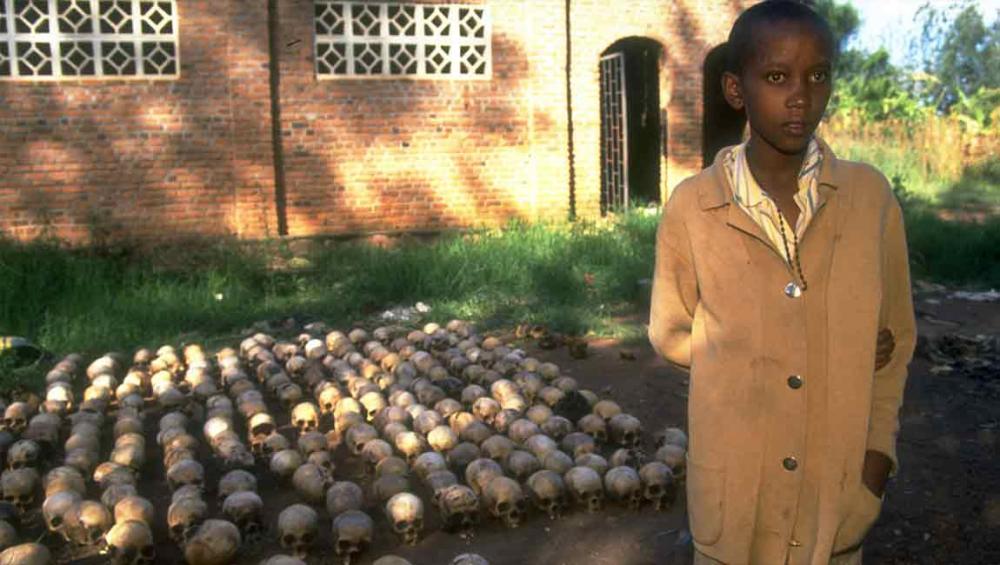Just Earth News | @JustEarthNews | 07 Apr 2018

UNICEF/UNI55086/Press
New York: As the world officially remembers the genocidal murder of 800,000 Rwandans in 1994, United Nations leaders warn that ethnic cleansing and mass atrocities continue to blight humanity and call for sharper action to prevent such wholesale violations.
Twenty-four years ago, on 7 April, ethnic Hutus in Rwanda began the frenzied slaughter of Tutsis, moderate Hutus and others in what is widely regarded as one of the darkest episodes in recent history.
In memory of the Rwandan victims – and as a sombre reminder of the international community’s failure to intervene – the UN observes 7 April every year as an “international day of reflection.”
“Today we remember all those who were murdered and reflect on the suffering of the survivors, who have shown that reconciliation is possible, even after a tragedy of such monumental proportions,” said Secretary-General Antonio Guterres in a message for the grim anniversary.
“Rwanda has learned from its tragedy; so must the international community,” Guterres said, expressing concern about “the rise of racism, hate speech and xenophobia around the world.”
“These base manifestations of human cruelty provide the breeding ground for far more evil acts,” the Secretary-General said, adding that he was particularly troubled by the systematic killings, torture, rape and humiliation of Rohingya Muslims in Myanmar.
The brutal persecution of the Rohingya, which has caused more than one million members of the ethnic and religious minority to flee to Bangladesh, was also first in the mind of Adama Dieng, the UN Special Adviser on the Prevention of Genocide, in an interview with UN News.
The horrific acts committed against the Rohingya will one day be brought before an international court, Dieng said, “and I have no doubt that they will be determined as crimes against humanity, as ethnic cleansing” and possibly as genocide.
Judicial punishment for such crimes is a start, but for more attention must be devoted to preventing them, said Dieng, a native of Senegal and leading international jurist.
“We said at the end of the Second World War ‘Never Again,’ but we witnessed the genocide of the Tutsis in Rwanda; we witnessed the genocide of the Muslims in Srebrenica,” he said, referring to the Bosnian Serb army’s slaughter in 1995 of thousands of Muslims who were rounded up in the town of Srebrenica, even though it had been declared a “safe area” by the UN.
An international framework of law and tribunals has evolved for holding accountable those who commit crimes against humanity.
In 1948, following the horrors of the Second World War, the fledgling UN adopted The Convention on the Prevention and Punishment of the Crime of Genocide. Genocide was defined as certain acts committed “with intent to destroy, in whole or in part, a national, ethnical, racial or religious group.”
At the UN World Summit in 2005, all Member States formally accepted the responsibility to protect their populations from “genocide, war crimes, ethnic cleansing and crimes against humanity.” They also agreed that when countries fail to do so, the international community has an obligation to intervene, through action by the Security Council and in accordance with the UN Charter.
But enforcing that international “Responsibility to Protect” victimized populations has often been hamstrung, Dieng said, as key countries invoke the principle of “non-interference in internal affairs.” He expressed frustration that the Security Council has not taken stronger action to prevent atrocities against civilians in Syria and South Sudan as well as Myanmar.
Genocides do not take place “all of a sudden,” Dieng said, highlighting the importance and possibility of prevention.
“Genocide is a process,” he said. “The Holocaust did not start with the gas chambers. It started with hate speech.”
In Rwanda and Bosnia, too, mass killings followed escalating hate speech and dehumanization. “That is why I should say that the world failed the Rwandan people, the world failed the Bosnian people, and I hope that the world will not fail the Rohingya population,” he said.
The UN’s annual day of reflection on the Rwandan genocide is important, Dieng said, “as a way first to honour those who fell to those crimes, but also as a lesson for the future.”
Secretary-General Guterres, in his statement, stressed that “states have a fundamental responsibility to protect their populations from genocide, war crimes, ethnic cleansing and crimes against humanity.”“By remembering what happened in Rwanda, we are also sending a strong message to whoever around the world is inclined to commit such a crime,” he said.
“It is imperative,” he said, “that we unite to prevent such atrocities from occurring, and that the international community sends a strong message to perpetrators that they will be held accountable.”
“To save people at risk, we must go beyond words,” he said.
The UN will hold a commemorative ceremony on the Rwandan genocide at its New York Headquarters on 13 April on the theme “Remember, Unite, Renew.”